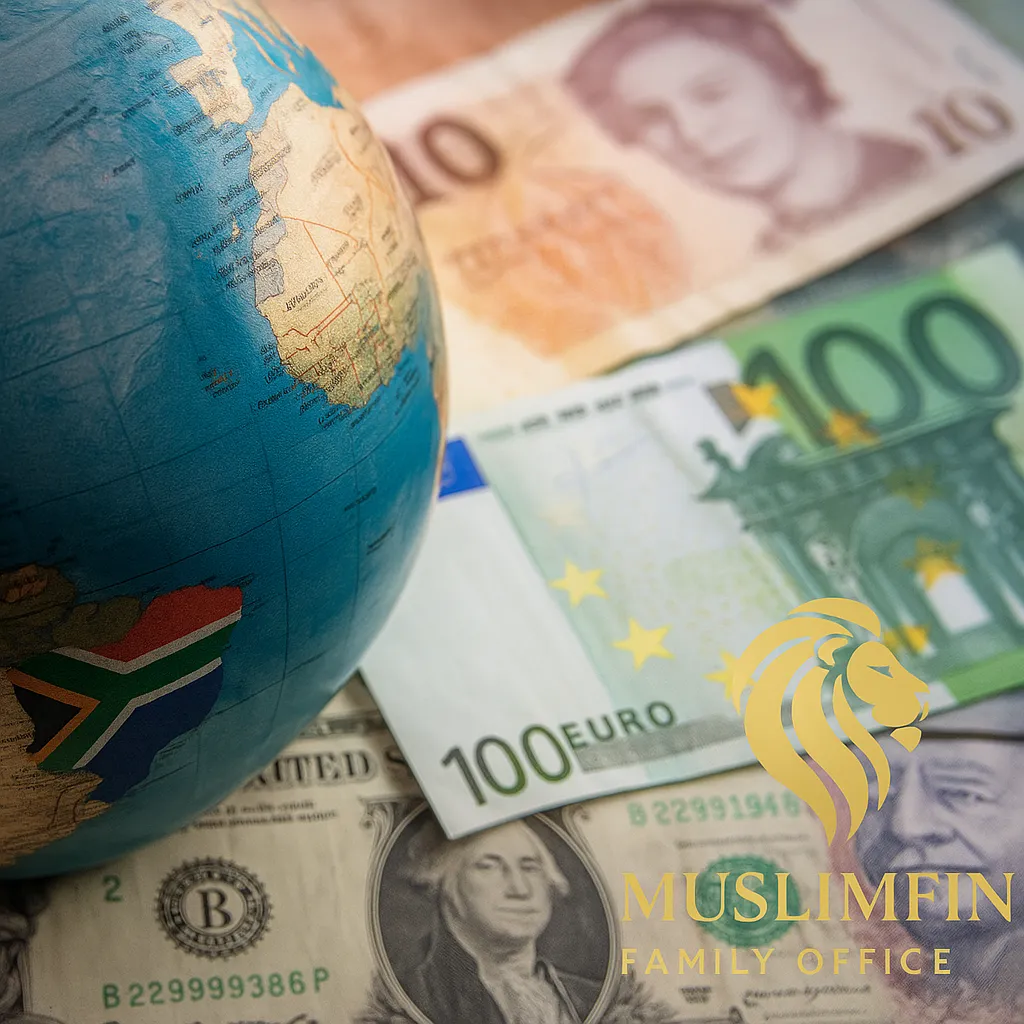
Creating Awareness: The Quest for Shariah-Compliant Offshore Cash Diversification for South African Muslim Investors

“Creating Awareness: The Quest for Shariah-Compliant Offshore Cash Diversification for South African Muslim Investors" by Mogamat Ali Salie
For Muslim investors in South Africa with surplus funds, strategic wealth management extends beyond local opportunities. The imperative to diversify cash holdings into hard currencies offshore is a prudent step for capital preservation and growth, especially given global economic uncertainties. However, a significant challenge emerges when seeking genuinely Shariah-compliant offshore bank products for this purpose. This article explores the limitations and lack of awareness surrounding these crucial financial instruments, drawing on recent insights and data.
The Growing Need for Offshore Diversification
South African investors, particularly those with substantial wealth, increasingly look to offshore markets to mitigate local currency volatility and access broader investment opportunities. For Muslim investors, this diversification must align with Islamic finance principles, which prohibit interest (riba), excessive uncertainty (gharar), and investments in non-permissible sectors. The goal is not merely wealth accumulation but ethical wealth stewardship, ensuring financial activities are permissible and contribute positively to society.
The Scarcity of Shariah-Compliant Offshore Cash Accounts
Despite the growing global Islamic finance market, estimated at nearly US$8 billion in 2024 and projected to exceed US$12 billion by 2025, and the presence of Islamic banking windows in major South African banks, a critical gap persists. Our research indicates a notable absence of explicitly advertised Shariah-compliant offshore bank accounts designed for South African Muslim clients seeking to diversify significant cash holdings in hard currency.
While local Shariah-compliant banking products are available, and some banks offer international payment services or foreign exchange for travel, these typically do not equate to dedicated offshore bank accounts for long-term cash diversification. For instance, a banking window focuses on facilitating international payments and foreign currency exchange for travel, rather than providing Shariah-compliant offshore cash management solutions. Similarly, an Islamic Bank’s ‘Foreigner Account’ caters to temporary residents within South Africa, not for South African citizens to hold funds offshore.
The Awareness Deficit: A Compounding Factor
This product scarcity is compounded by a broader lack of awareness and education regarding Islamic financial principles, even within the Muslim community itself. This deficit in understanding likely extends to the complexities of offshore Shariah-compliant solutions, making it harder for demand to coalesce and for providers to innovate.
South Africa’s Muslim community, though a minority representing approximately 2% of the total population, includes a significant segment of HNW and UHNW individuals. While specific wealth distribution data for this group is not readily available, anecdotal evidence points to substantial affluence within certain Muslim families. This demographic represents a considerable, yet underserved, market for sophisticated Shariah-compliant offshore financial services.
Regulatory and Operational Hurdles
The challenges are not solely demand-side. The existing regulatory environment in South Africa is primarily designed for conventional banking, creating hurdles for Islamic financial services. The absence of specific regulations tailored to Islamic banking creates uncertainty and impedes the development of innovative products, particularly those with an offshore component. Furthermore, establishing Shariah-compliant divisions requires significant investment in separate systems, processes, technology, and specialised human resources, which can deter conventional banks from expanding their offerings into niche areas like offshore cash accounts.
MuslimFin’s Role: Advocating for Ethical Diversification
At MuslimFin Family Office, we recognise the critical need for robust Shariah-compliant offshore solutions. Our commitment is to guide our HNW and UHNW clients through this complex landscape, advocating for greater product development and awareness. We believe that ethical wealth management should not be constrained by limited options, and we actively work to bridge this gap by identifying permissible avenues for diversification and engaging with financial institutions to foster innovative, Shariah-compliant solutions.
Conclusion
The quest for Shariah-compliant offshore bank products for hard currency cash diversification remains a significant challenge for South African Muslim investors. The confluence of limited product offerings, a lack of awareness, and regulatory complexities creates a market gap that needs urgent attention. As the global Islamic finance industry continues its impressive growth, there is an undeniable opportunity for financial institutions to innovate and cater to the specific, ethically driven needs of this affluent and discerning client segment. MuslimFin Family Office remains at the forefront, empowering our clients to achieve both financial prudence and spiritual peace of mind.
